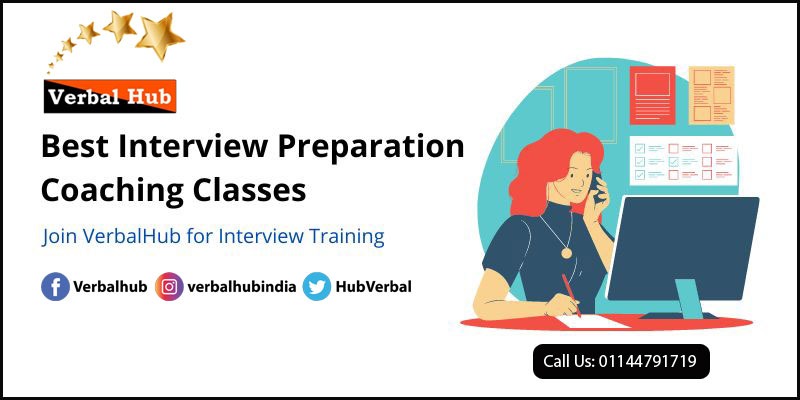Best Interview Preparation Coaching Classes

The job interview process can be an overwhelming experience for many individuals. It requires both experience and qualifications additionally the ability to effectively communicate and present oneself to potential employers. This is where interview coaching, preparation, training, and classes come into play. In this comprehensive guide, we will explore the various aspects of interview assistance, including the importance of interview coaching, strategies for interview preparation, the benefits of interview training, and the value of interview classes.
Preparing for the questions to ask in an interview is a challenging task, however, where there is will there is a way. For every tough work can be made easy through the right training and effective coaching. We, VerbalHub, have a team of industry giants who have taken the end number of interviews and who have given the end number of interviews and have made the best course for your interview coaching and interview training. Our interview preparation program consists of three stages that are designed to help you improve your basic English skills and provide you with targeted training to excel in each round of HR interview questions.
- 1. Counseling and Study Plan: The first stage of our program is counseling, where we assess your current level of preparation and create an effective study plan based on requirements. We provide you with recommended study hours, relevant study materials, and key areas so that you know about the types of interviews and how to deal with them.
- 2. Fundamentals of interviews: The second stage focuses on improving your communication skills, Business vocabulary, and business antiquate. The mentors suggest you with tips and tricks mainly to deal with the art of speaking with a convincing technique. Then you are trained to tackle each type of job interview question in the exam. Our trainer follows a certain course curriculum and targets the training avail and delivers to the point your communication and sense of reply. In the end, you are suggested to do a self-mock drill of practice questions so that you may realize your general errors.
- 3. Mock Interviews: In this stage, Mentors test you through a lot of tricky questions. Our trainers analyze your response. They customize your job interview questions and answers according to your needs. We keep on training you until you fix your errors. Once you achieve your height of confidence, you are suggested to attend your job interviews.
I. Interview Coaching
Definition and Importance: Interview coaching involves working with a professional coach who provides guidance, support, and expert advice to individuals seeking to improve their interview skills. Coaches offer personalized assistance to help candidates present themselves confidently and effectively during interviews.
Key Benefits:
a) Enhanced Interview Skills: A coach helps candidates develop effective interview techniques, including body language, tone of voice, and content delivery.
b) Confidence Boost: Through mock interviews and constructive feedback, coaching helps candidates build confidence and reduce anxiety.
c) Self-Awareness and Strengths Identification: Coaches find out the inner skills of the candidates and work on their strengths and weaknesses, enabling them to present their qualifications more effectively.
d) Tailored Strategies: Coaches customize their approach to meet the unique needs and goals of each individual, maximizing their chances of success.
II. Interview Preparation
Research and Company Knowledge:a) Research the Company: Gather information about the organization's values, mission, culture, recent news, and the specific role for which you are applying.
b) Understand the Job Requirements: Review the job description thoroughly and align your skills and experiences with the position's requirements.
c) Anticipate Common Questions: Prepare responses for common interview questions related to your background, strengths, weaknesses, and career goals.
Practice:
a) Mock Interviews: Practice with a friend, or family member, or through online tools that simulate interview scenarios.
b) Rehearse Responses: Prepare concise, clear, and impactful answers to common questions while showcasing your achievements and skills.
c) Fine-tune Non-Verbal Communication: Pay attention to your body language, eye contact, posture, and tone of voice to create a positive impression.
III. Interview Training
Purpose and Benefits: Interview training programs are designed to enable candidates to acquire the required knowledge and necessary skills so that they qualify the job interviews. These programs offer structured learning experiences, often led by experienced professionals.
Key Components:
a) Mock Interviews and Feedback: Participants undergo mock interviews with expert trainers who provide valuable feedback and suggestions for improvement.
b) Skill Development: Training programs focus on enhancing interview techniques, including effective communication, active listening, and rapport-building.
c) Industry Insights: Participants gain valuable insights into industry trends, interview best practices, and employer expectations.
d) Confidence Building: Through guided practice and constructive feedback, training programs help boost participants' confidence and interview performance.
IV. Interview Classes
Definition and Format: Interview classes are organized training sessions that provide group instruction on interview strategies and techniques. These classes can be in-person or conducted online.
Advantages:
a) Peer Learning: Participants can learn from the experiences and perspectives of fellow attendees, expanding their knowledge and understanding.
b) Cost-Effective Option: Interview classes are often more affordable compared to individual coaching, making them accessible to a wider audience.
c) Structured Curriculum: Classes typically follow a structured curriculum, covering various interview scenarios, question types, and best practices.
d) Networking Opportunities: Attending classes with professionals who have the same mind, thought and thinking allows participants to connect with professionals network.
ConclusionInterview coaching, preparation, training, and classes play a vital role in enhancing a candidate's chances of success in job interviews. Whether you opt for individual coaching, self-preparation.




